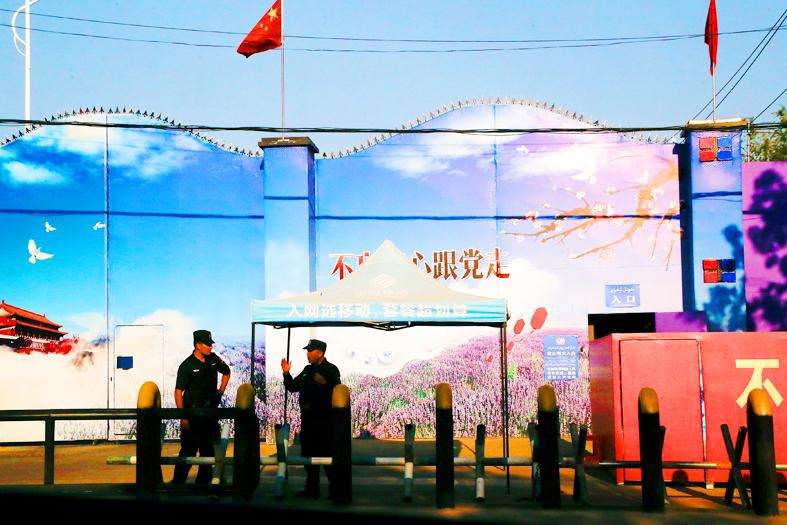Beijing’s reshuffle of officials in Xingjiang might herald a hardening of repression against Uighurs, an academic at the Institute for National Defense and Security Research said.
Since 2018, the Chinese Communist Party (CCP) has replaced a slew of top officials in Xinjiang’s communist party, researcher Shih Chien-yu (侍建宇) wrote in a Nov. 9 post on the institute’s blog.
Last month, the government reshuffled three top officials of the regions’ communist party, which marks a near-total turnover of its leadership since 2018, Shih said.

Photo: Reuters
The newcomers include He Zhongyou (何忠友), who is to become the deputy secretary of the Standing Committee for the Xinjiang Uighur Autonomous Region, a position of significant power, he said.
Local party secretary Chen Quanguo (陳全國), the only leader of the old guard remaining, would likely be dismissed at the CCP’s National Congress next year, he said.
The reshuffling meant that the CCP has removed virtually every regional official who was sanctioned by the US and its allies, he said.
The move is designed to test Western resolve in imposing new sanctions, as the newcomers would almost certainly continue to carry out repressive policies, Shih said.
Although China’s governance of Xinjiang has been widely criticized by the international community for human rights abuses, the CCP believes that it has made no mistakes, he said.
Instead, it blamed local officials for their failure to represent the party’s achievements in a positive light and their lack of local knowledge as outsiders who had been appointed to the region, he said.
He, an apparatchik trained in data analysis and management at the London School of Economics and University of Massachusetts Boston, has substantial experience in China’s mass surveillance program, Shih said.
He’s professional qualifications are a fit for Xinjiang — a region fast becoming a test bed for digital surveillance technologies — and he has experience in working with foreign officials and press from previous posts, he said.
Beijing increasingly considers Xinjiang a strategic launching pad to expand China’s sphere influence, while the rise of a Taliban-controlled Afghanistan further elevates the importance of security in the region, Shih said.
These factors suggest that Beijing would continue to utilize the “high-pressure” tactics it favored to tighten its grip on Xinjiang, while employing propaganda to conceal its actions, he said.

A strong continental cold air mass is to bring pollutants to Taiwan from tomorrow, the Ministry of Environment said today, as it issued an “orange” air quality alert for most of the country. All of Taiwan except for Hualien and Taitung counties is to be under an “orange” air quality alert tomorrow, indicating air quality that is unhealthy for sensitive groups. In China, areas from Shandong to Shanghai have been enveloped in haze since Saturday, the ministry said in a news release. Yesterday, hourly concentrations of PM2.5 in these areas ranged from 65 to 160 micrograms per cubic meter (mg/m³), and pollutants were

Taiwan’s armed forces have established response protocols for a wide range of sudden contingencies, including the “Wan Chun Plan” to protect the head of state, the Ministry of Defense (MND) said today. After US President Donald Trump on Saturday launched a series of airstrikes in Venezuela and kidnapped Venezuelan President Nicolas Maduro, concerns have been raised as to whether China would launch a similar “decapitation strike” on Taiwan. The armed forces regularly coordinate with relevant agencies and practice drills to ensure preparedness for a wide range of scenarios, Vice Minister of National Defense Hsu Szu-chien (徐斯儉) told reporters before a

EVA Airways on Saturday said that it had suspended a pilot and opened an investigation after he allegedly lost his temper and punched the first officer several times as their plane was taxiing before takeoff at Los Angeles International Airport. According to a report published on Thursday by The Reporter, the incident occurred after the flight’s Malaysian first officer tried to warn the Taiwanese pilot, surnamed Wen (文), that he was taxiing faster than the speed limit of 30 knots (55.6kph). After alerting the pilot several times without response, the first officer manually applied the brakes in accordance with standard operating

Japanese Councilor Hei Seki (石平) on Wednesday said that he plans to visit Taiwan, saying that would “prove that Taiwan is an independent country and does not belong to China.” Seki, a member of the Japan Innovation Party, was born in Chengdu in China’s Sichuan Province and became a naturalized Japanese in 2007. He was elected to the House of Concilors last year. His views on the Chinese Communist Party (CCP) — espoused in a series of books on politics and history — prompted Beijing to sanction him, including barring Seki from traveling to China. Seki wrote on X that he intends